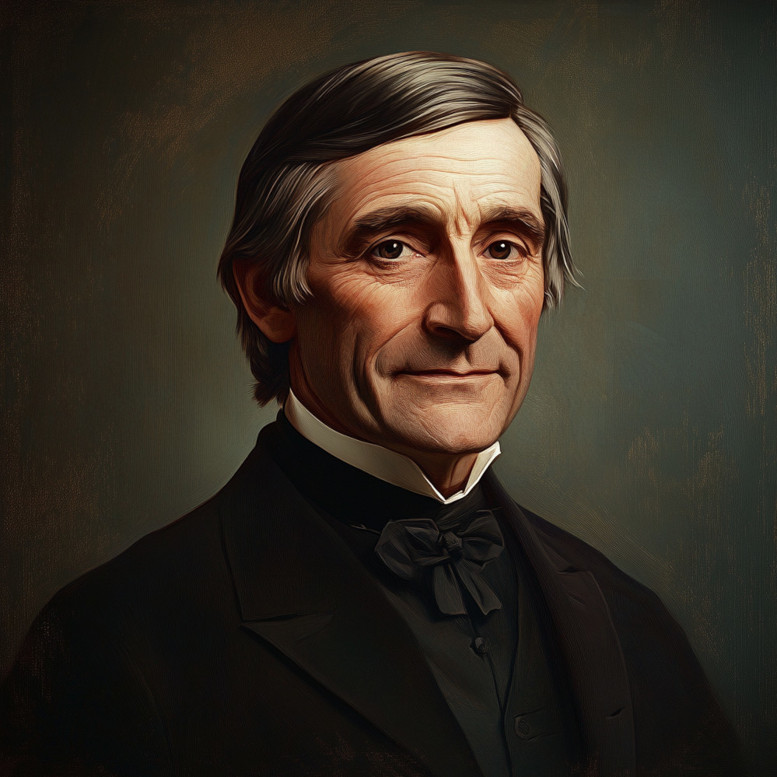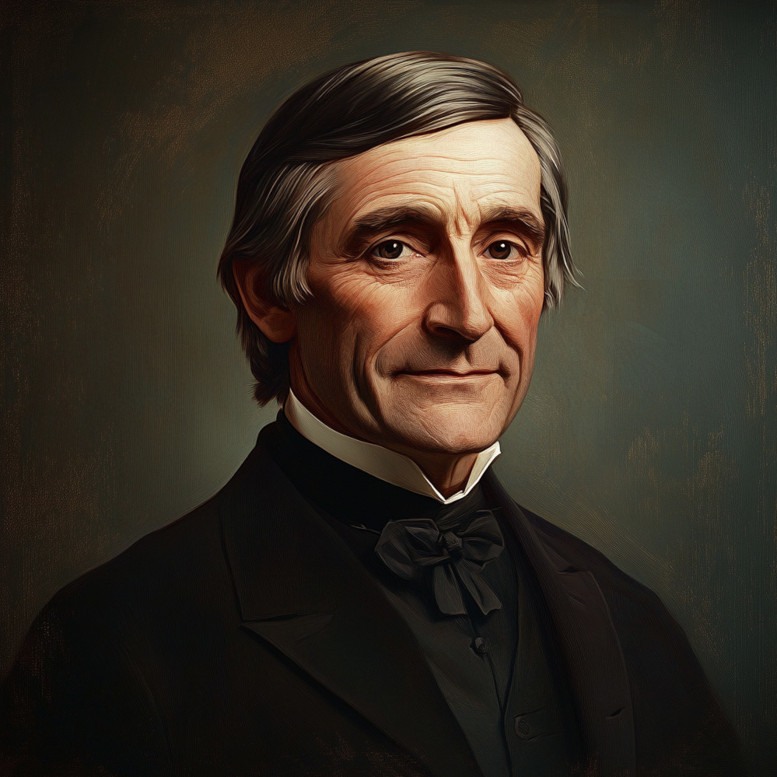


Ralph Waldo Emerson (1803–1882) was an American essayist, lecturer, philosopher, and poet who led the transcendentalist movement of the mid-19th century. Emerson's works emphasized individualism, self-reliance, and the inherent goodness of nature, challenging the societal norms and religious doctrines of his time. His essays, such as "Self-Reliance" and "Nature," remain foundational texts in American literature and philosophy, influencing generations of thinkers, writers, and social reformers.
Early Life and Education
Birth and Family Background: Ralph Waldo Emerson was born on May 25, 1803, in Boston, Massachusetts, into a family with deep roots in New England's religious and intellectual traditions. His father, William Emerson, was a Unitarian minister, and his mother, Ruth Haskins Emerson, was known for her piety and dedication to her children. Emerson was one of eight children, though several of his siblings died young.
Education: Emerson was a precocious child and attended the Boston Latin School, where he excelled academically. He entered Harvard College at the age of 14 and graduated in 1821. Although he was not a standout student, Emerson developed a love for reading and began to explore diverse fields of knowledge, including philosophy, literature, and religion.
Early Career and Personal Challenges: After graduating from Harvard, Emerson briefly taught at a girls' school run by his brother William. He then studied at Harvard Divinity School, preparing to follow in his father's footsteps as a minister. Emerson was ordained as a Unitarian minister in 1829 and served at Boston's Second Church. However, he struggled with the constraints of traditional religious doctrine and eventually resigned his position in 1832, citing a loss of faith in the rituals of the church, particularly the administration of the Lord's Supper.
The Transcendentalist Movement
European Influences and Intellectual Awakening: After leaving the ministry, Emerson traveled to Europe, where he met and was influenced by leading intellectuals of the time, including the British romantic poets William Wordsworth and Samuel Taylor Coleridge, and the German philosopher Friedrich Schleiermacher. These encounters deepened his interest in the concepts of individualism and the spiritual connection between humans and nature.
Return to America and Founding Transcendentalism: Upon returning to the United States, Emerson settled in Concord, Massachusetts, and became a central figure in the emerging transcendentalist movement. Transcendentalism was a philosophical and literary movement that emphasized the importance of the individual, the spiritual over the material, and the unity of all creation. It was a reaction against the growing industrialization, materialism, and rigid religious orthodoxy of the time.
In 1836, Emerson published his groundbreaking essay Nature, which articulated many of the core ideas of transcendentalism. In Nature, Emerson argued that the natural world was a manifestation of the divine and that individuals could achieve spiritual enlightenment through direct experience with nature, free from the constraints of organized religion and society. The essay called for a new way of understanding the world, emphasizing intuition and the inner self as the sources of truth.
Major Works and Ideas
"Self-Reliance" (1841): One of Emerson's most famous and influential essays, "Self-Reliance," was published in 1841. In it, Emerson champions the importance of individualism, nonconformity, and personal integrity. He encourages readers to trust their own thoughts, beliefs, and instincts, rather than conforming to societal expectations or relying on the approval of others. The essay's famous dictum, "Trust thyself: every heart vibrates to that iron string," encapsulates Emerson's belief in the power of the individual to shape their own destiny.
"The American Scholar" (1837): Delivered as a speech to the Phi Beta Kappa Society at Harvard, "The American Scholar" is often considered Emerson's call for an intellectual declaration of independence for America. In this address, Emerson urged American scholars to break free from European intellectual traditions and to develop their own unique voices, grounded in the American experience. He emphasized the importance of self-reliance, creativity, and the active pursuit of knowledge. Oliver Wendell Holmes Sr. later referred to "The American Scholar" as "our intellectual Declaration of Independence."
"The Divinity School Address" (1838): In this controversial address delivered to the graduating class of Harvard Divinity School, Emerson challenged traditional Christian doctrines and argued for a more personal and intuitive approach to religion. He criticized the church for its focus on dogma and ritual, advocating instead for an individual spiritual experience rooted in the divine presence within each person. The address was met with considerable backlash from religious leaders, but it also cemented Emerson's role as a leading voice in the transcendentalist movement.
"The Over-Soul" (1841): In "The Over-Soul," Emerson explores the concept of a universal, all-encompassing spiritual presence that connects all living beings. This idea of the Over-Soul reflects Emerson's belief in the unity of all creation and the interconnectedness of the individual with the divine. The essay emphasizes the importance of self-awareness and the pursuit of spiritual understanding, suggesting that through introspection and communion with the Over-Soul, individuals can transcend the limitations of the physical world.
Influence and Legacy
Impact on American Thought: Ralph Waldo Emerson's ideas had a profound impact on American philosophy, literature, and culture. He helped shape the intellectual landscape of the 19th century, influencing a wide range of thinkers and writers, including Henry David Thoreau, Walt Whitman, Emily Dickinson, and Frederick Douglass. Emerson's emphasis on individualism, self-reliance, and the sanctity of nature resonated with the American spirit of independence and self-determination.
Social and Political Influence: While Emerson was primarily a philosopher and writer, his ideas also had significant social and political implications. His writings on individual freedom, nonconformity, and moral responsibility contributed to the broader discourse on abolitionism, women's rights, and social reform. Emerson was a vocal opponent of slavery and supported the abolitionist movement, although he was not as radical as some of his contemporaries. His ideas also influenced the transcendentalists' advocacy for education reform, the rights of Native Americans, and environmental conservation.
Legacy as a Literary Figure: Emerson's essays, lectures, and poetry remain central to the canon of American literature. His work continues to be studied and celebrated for its insights into the human condition, its eloquent expression of transcendentalist ideals, and its enduring relevance to contemporary issues. Emerson's influence extends beyond literature to the broader fields of philosophy, religion, and social thought, where his ideas continue to inspire and challenge new generations.
Later Life and Death
Later Years: In his later years, Emerson continued to write and lecture, although his output slowed due to declining health and memory loss. Despite these challenges, he remained an active intellectual figure and a revered elder statesman of American letters. Emerson's home in Concord became a gathering place for prominent writers, thinkers, and reformers of the time.
Death: Ralph Waldo Emerson died on April 27, 1882, in Concord, Massachusetts, at the age of 78. He was buried in Sleepy Hollow Cemetery in Concord, where his grave remains a site of pilgrimage for admirers of his work.
Ralph Waldo Emerson was a towering figure in American intellectual history, whose ideas on individualism, self-reliance, and the spiritual connection to nature have had a lasting impact on the nation's cultural and philosophical development. As a leading voice of the transcendentalist movement, Emerson challenged conventional thought and inspired a generation of writers, thinkers, and reformers to seek truth within themselves and to embrace the possibilities of the human spirit. His legacy endures as a symbol of American idealism, creativity, and the pursuit of higher knowledge.

We use cookies
We use cookies and other tracking technologies to improve your browsing experience on our website, to show you personalized content and targeted ads, to analyze our website traffic, and to understand where our visitors are coming from. Privacy Policy.